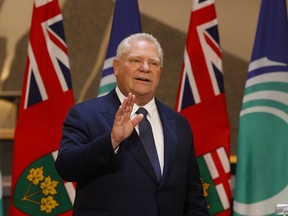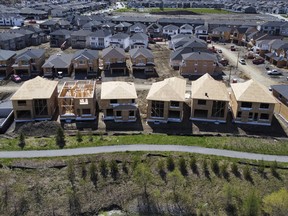Money comes with conditions attached — such as zoning changes that allow for uncontested fourplex construction
Article content
Last week, Prime Minister Justin Trudeau unveiled a $6 billion funding initiative aimed at tackling Canada’s housing crisis by providing funds to municipalities to build infrastructure that’s essential for new development. But the money is coming with conditions attached — such as zoning changes that allow for uncontested fourplex construction — and that has some provinces fuming. The Financial Post’s Shantaé Campbell unpacks the program and what’s driving the provincial resistance.
Advertisement 2
Article content
What’s in the fund?
Article content
While detailed budget allocations for each year and province are still pending, Ottawa has said that the new fund under Budget 2024 will be split into two parts. The fund earmarks $1 billion for municipalities to address pressing infrastructure issues such as water, wastewater, stormwater and solid waste projects, directly contributing to increased housing stock. Additionally, it sets aside $5 billion for provincial and territorial agreements to bolster long-term housing supply priorities. Provinces are required to finalize agreements by Jan. 1, 2025, with territories having until April 1, 2025.
So, what’s the catch?
Despite the widespread acknowledgement that we need to build more housing, some provinces, such as Quebec and Ontario, have pushed back against the plan due to the stipulations attached. First among them, that accessing the fund requires provinces to eliminate single-family zoning and grant automatic permission for fourplex construction, a process known as “as-of-right” zoning. This designation would mean no special allowances are needed to build a fourplex in any neighbourhood currently zoned as single-family. The rules would also make it easier to build duplexes, triplexes, townhomes and multi-unit apartments. The funding also stipulates a three-year freeze on development charges for cities with populations exceeding 300,000.
Article content
Advertisement 3
Article content
Why exactly are the provinces upset?

Ontario Premier Doug Ford had previously rejected the idea of eliminating single-family zoning, and his office reiterated its commitment to local decision-making on zoning matters after the Liberal plan was announced. His office went so far as to say that allowing fourplexes across Ontario would be a “massive mistake.” Similarly, Quebec officials criticized the federal government’s approach, accusing Ottawa of encroaching on provincial jurisdiction and urging it to instead address housing through issues such as immigration, which are under federal control. Housing Minister Sean Fraser, however, has indicated that the federal government is prepared to bypass provinces that do not agree to the fund’s conditions and work directly with municipalities instead. This stance reflects previous tensions over housing policies, including over the Housing Accelerator Fund (HAF), which faced resistance from provinces and prompted threats of legislative action.
What is the Housing Accelerator Fund?
In March 2023, Ottawa launched a $4 billion HAF as part of its $82 billion National Housing Strategy (NHS). The HAF aims to streamline construction processes in order to build 380,000 new homes over the next decade. It offers initial funding to speed up construction and additional support upon completion, but requires innovative proposals from local municipalities, such as expediting projects, increasing housing density and promoting affordable units. The federal government has already signed funding agreements with 72 municipalities. These regions have committed to zoning changes that increase density by allowing greater height, reduced parking requirements and as-of-right development approvals for fourplexes. A number of municipalities in Ontario, such as Toronto, Mississauga, Vaughan, and Hamilton are already receiving funding through HAF.
Advertisement 4
Article content
Recommended from Editorial
If Toronto has already agreed to fourplexes, why is Ontario upset?
In 2022, the Ford government’s More Homes Built Faster Act enabled the construction of up to three units on residential land zoned for one home. Rather than mandating extensive zoning reform, such as “as-of-right” zoning across Ontario, Ford indicated his willingness to collaborate with the federal government, after Trudeau’s most recent announcement. However, he doubled down on his stance that planning decisions regarding fourplexes would remain under municipal jurisdiction. Last month, Ford stated that a province-wide fourplex policy was “off the table” for his government and that certain residents oppose the idea of multiplexes in their neighbourhoods. He said his government’s focus is on constructing single-dwelling homes and townhouses. “I can assure you 1,000 per cent, you go in the middle of communities and start putting up four-storey, six-storey, eight-storey buildings right deep in the communities, there’s going to be a lot of shouting and screaming,” Ford said at a pre-budget news conference in Richmond Hill.
• Email: shcampbell@postmedia.com
Bookmark our website and support our journalism: Don’t miss the business news you need to know — add financialpost.com to your bookmarks and sign up for our newsletters here.
Want to know more about the mortgage market? Read Robert McLister’s new weekly column in the Financial Post for the latest trends and details on financing opportunities you won’t want to miss
Article content




